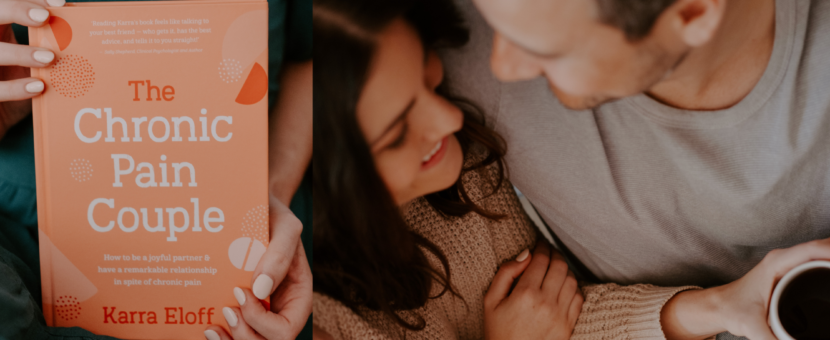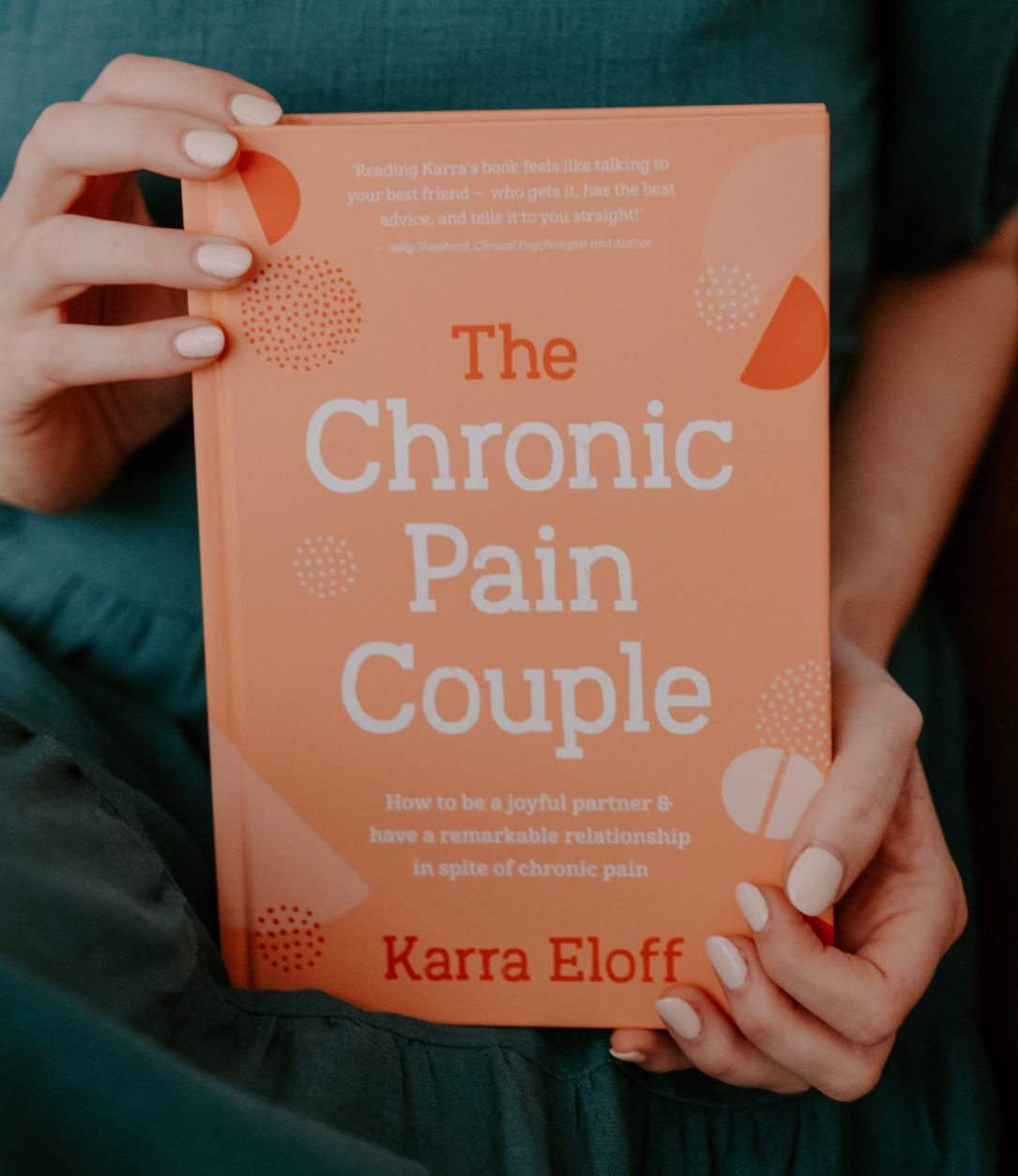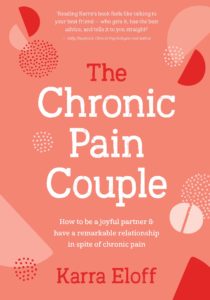Are you too tired to engage with your partner? Is your medication reducing your libido? Or is sex simply way too painful? You’re not alone. Karra Eloff has some helpful strategies to reignite that connection and redefine what sex means to you in her new book The Chronic Pain Couple. (Keep reading for an extract)
It’s National Pain Week in Australia, the annual awareness raising event co-ordinated by Chronic Pain Australia to draw attention to the plight of people suffering from chronic pain and, by doing so, reduce the social and other barriers related to living with chronic pain. Helping to break down some of the relationship and intimacy barriers faced by people living with chronic pain is Karra Eloff, author of our latest release The Chronic Pain Couple.
When Karra was first diagnosed with a chronic pain condition as a newlywed, over 10 years ago, her relationship was understandably affected. She could no longer participate in the active lifestyle she and her husband were accustomed to, and even low-energy dates or long periods of sitting became unbearably painful.
As Karra desperately searched for advice on how to revive her beautiful marriage while also navigating painful surgeries, new medications, flare ups & fatigue, all she could find were articles advising how to ‘survive pain and sustain a relationship’.

Who is Karra Eloff?
Karra practices what she preaches. She is a health professional, speaker, managing director and co-founder of two private psychology clinics on the East Coast of Australia, and the founder of The Chronic Pain Couple, an organisation that delivers practical support to people with chronic pain and their loved one, a wife, and a mother.
In the opening chapter of The Chronic Pain Couple Karra says, “I don’t think anyone wants to just survive. I also don’t believe any couple wants a relationship that’s just sustained either”.
What follows is the book she ‘wishes she had found 10 years ago’. Combining a decade of personal and professional experience with current academic research, Karra has created a trailblazing, compassionate, low-energy and practical path to a remarkable new normal. The Chronic Pain Couple delivers much-needed solutions to couples living with one partner’s chronic pain and is a true guide on ‘How to be a joyful partner & have a remarkable relationship in spite of chronic pain.’
“I want you and everybody hurting physically and emotionally to know joy and pain can co-exist. I want you to know that no matter your circumstances right now, a deeply satisfying life is possible when you are intentional about what you allow in your life and mind. You can create a brilliant new normal!” – Karra Eloff (The Chronic Pain Couple, Chapter: The New Normal)
USD $27.99 Tax IncludedAdd to cart
The Chronic Pain Couple
On average, one in five adults suffer from chronic pain. In older people, the number rises to three in five. Most of these people don’t realise they don’t have to settle for a survival-based coexistence with their partner or bury their hopes for success and joy under a mountain of heat packs or duvets.
Chronic illness or pain, according to Karra, need not hold you back from experiencing personal joy and success. It is possible to forge a path to remarkable-to move the dial of a relationship challenged with chronic pain from embattled and exhausted to joyful and passion-filled.
This is possible through small, practical changes that require little energy but make a big impact in the areas of:
• Communication
• Mental health
• Intimacy
• Personal Success
On Sex: Tips from Karra Eloff, Author of The Chronic Pain Couple
There is a reason this section was placed towards the end of the book. It’s because sex encompasses everything. All the tips offered within this book to improve your relationship are actually strategies to improve your sex life, too. Experiencing a fully satisfying sex life and allowing yourself to be vulnerable in intimate moments depends on your feeling safe, accepted, and confident in your relationship. As you so well know, there are many real and big barriers to those feelings for partners with chronic pain, but they can be overcome.
There are three main problems related to sex that chronic pain couples often report:
» Chronic pain causes decreased desire.
“Most days I’m so fatigued, I can barely get through a shower. Sex is not going to happen.”
Fatigue is the most common self-reported cause of loss of desire, and it can be one of the hardest parts of living with persistent pain.
Tip: Sex Schedule
Before you start to build your case for the importance of spontaneity, take a moment to reflect on your past sexual experiences. How many of us have honestly only experienced impulsive, unplanned sex? It’s interesting how even online articles aimed at teaching readers how to have spontaneous sex suggest driving to a partner’s work to surprise them. That’s not unplanned, spontaneous sex! How much planning is involved in getting to your partner’s workplace!?
Creating a sex schedule involves choosing the exact day and time sex will take place. This way of going about sex is great if you’re someone who needs to plan every activity in your day and week according to your pain and energy levels. It will likely relieve tension around when sex will happen, and if you know when you’ll be having sex, you can better prepare, perhaps by planning a pain-reducing activity beforehand (i.e. a bath, stretch, taking medication, rest).
» Sex is painful.
“I’ve never experienced sex that wasn’t painful. I suffer from endometriosis and the pain of sex never outweighs the pleasure for me, so I try to avoid it much as possible. I’m often worried my partner will try to initiate sex and feel guilty about how little sex we’re having.”
Painful sex is actually common, so much so that there is a name for it: dyspareunia. If you experience dyspareunia, I encourage you to search for a GP who cares about your intimate life. If after exploring solutions with your healthcare team you find that intercourse is still too painful for you, you might need to break free from the idea of sex being synonymous with penetration.
Tip: Change how you define Sex
I’ve said before that sex does not need to be penetration. There are so many deeply intimate activities you and your partner can do and many ways for you to enjoy closeness and each other’s bodies without engaging in intercourse.
If you’re ready to shift your focus from intercourse to other sensual and sexual activities, grab your partner, pens and paper and separately jot down other sexual activities you enjoy. Perhaps you like certain ways of being touched or spoken to. It’s okay to start small. Perhaps you enjoy taking a bath together or massaging each other. Spend time researching different kinds of non-penetrative sex and decide with your partner what you’re both comfortable with and excited by.
» Partners of people in pain feel undesired or unloved.
“My husband asks me often if I still love him. When I ask him why, he says that it’s because I don’t initiate sex any more. Since starting my new medication, I have no libido.”
Partners who don’t experience persistent pain or dyspareunia themselves are often in such a different headspace when it comes to sex. Obviously, if we didn’t have pain, it’s likely we would be too! It’s no surprise that tension forms in a relationship when a partner’s attempts to initiate sex are routinely unsuccessful and a couple’s sex life takes a nosedive because of pain. This tension arises not solely because of a lack or change of physical satisfaction. Sex is more than just a physical connection, it’s a bonding experience.
Tip: Everyday Foreplay
If you think about foreplay, more often than not you’ll think of touching, caressing and loving interactions that happen just before intercourse. We don’t need to jump under the covers to enjoy foreplay, though. ‘Everyday foreplay’ is a strategy we can use to show our partners they’re desired each day. It’s a strategy to give and receive comfort through intimate touch and loving communication using little energy!
Firstly, touch your partner affectionately each day. If you currently engage in habitual touch, change what you do, where you touch or when you touch and for how long. To add to this, start to use loving words more purposefully, and often. Decide each day on a kind or loving statement to say to your partner. Compliments or showing appreciation are good starting points.
I told you these tips were going to be low energy but don’t be fooled by their simplicity — they’re powerful when practised often!
This was just a small selection of advice from the ‘On Sex’ section of The Chronic Pain Couple.
For more in depth advice, anecdotes, and practical strategies to help you with communication, mental health, personal success, and of course intimacy, purchase your own copy of The Chronic Pain Couple here
USD $27.99 Tax IncludedAdd to cart



